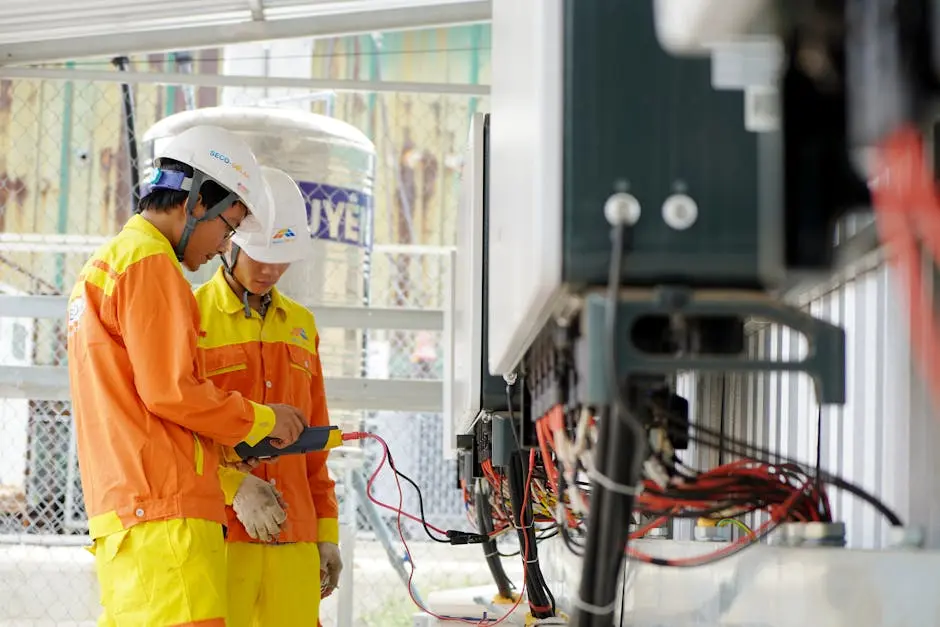Running an electrical business comes with its own set of challenges. One essential aspect that business owners often overlook is electrician insurance. In this blog, we’ll explore why electrician insurance is crucial for safeguarding your business and ensuring its long-term success.
Understanding Electrician Insurance
At its core, electrician insurance is a specialized form of coverage designed specifically for electrical businesses. It includes various types of protection to cover potential risks and mishaps in daily operations. At its essence, this type of insurance is not just a safeguard; it’s a strategic asset that affords peace of mind to business owners. Imagine having the certainty that, no matter what unexpected events occur, your business is financially protected. By limiting liability and covering potential damages, this type of insurance forms the backbone of a reliable risk management strategy.
The specific components of electrician insurance are tailored to handle the unique environments that electricians often find themselves in. For instance, when dealing with high-voltage equipment or working in unpredictable conditions, having insurance that specifically addresses these risks is paramount. Unlike generic business insurance, electrician insurance addresses field-specific concerns, ensuring that policies reflect the actual challenges encountered in day-to-day operations. It’s more than just a blanket protection; it’s a customized safety net for every business need. This not only adds value to your business offerings but also reassures clients of your competence and professionalism, enhancing your market reputation.
Key Types of Coverage Included
Electrician insurance typically includes general liability, commercial auto, and workers’ compensation. Each of these plays a crucial role in protecting different aspects of your business. For instance, general liability coverage helps mitigate legal costs arising from accidents, property damage, or client injuries. Imagine a scenario where a client’s home sustains damage during an installation—having this coverage ensures that such incidents are handled professionally without draining your financial resources.
Workers’ compensation is another critical component, protecting employees against injuries sustained on the job. This coverage not only safeguards employees’ well-being but also protects the employer from potential lawsuits, fostering a safe and confident workplace environment. As for commercial auto insurance, it’s indispensable for any electrical business that relies on vehicles for service delivery. In the event of an accident involving your company vehicle, this insurance ensures that your business assets are protected and operational disruptions are minimized.
Cyber liability insurance is an emerging need that every electrician business should consider. As more operational aspects shift online, the threat of cyberattacks becomes more prevalent. This type of insurance provides protection against data breaches and malware attacks, ensuring that sensitive information remains secure. Given the increasing reliance on digital tools in electrical work diagnostics and client interactions, having coverage for these risks is now more important than ever.
The Risks of Operating Without Insurance
Operating without proper insurance exposes your business to various risks, including financial losses from lawsuits, damage claims, or even employee injuries. Consider the potential setbacks that could arise from a litigation process. The costs associated with legal defense alone can be crippling, let alone potential settlement amounts. Without the financial shield of appropriate coverage, your business could face severe financial instability or even closure.
Moreover, running an uninsured business can lead to reputational damage. Clients today are more informed and cautious, often seeking out businesses that demonstrate responsibility and care through having proper insurance. The absence of insurance could be seen as a red flag, deterring potential clients and impacting the firm’s credibility. It’s not just about financial loss; it’s about maintaining trust and demonstrating a commitment to operational safety and reliability. By ensuring compliance with industry standards through insurance, your business can meet client expectations and build long-term relationships based on trust and assurance.
In addition, lacking insurance leaves you vulnerable to statutory penalties. Many regions mandate specific types of insurance for businesses, and non-compliance can result in fines or legal action. It’s essential to check local regulations and ensure that your insurance policy aligns with mandatory legal requirements, another reason why consulting with an insurance expert can be invaluable.
How Insurance Can Enhance Business Reputation
Being insured not only protects your business but also instills confidence in your clients. It shows professionalism and a commitment to quality service, enhancing your reputation in the industry. Clients look for reliable and responsible service providers who can offer assurance on their services, and having insurance is a clear indicator of this stability. It shows that you value security and are prepared for the unexpected, which reassures clients and can be a deciding factor when they choose between businesses.
Furthermore, by carrying complete insurance coverage, you differentiate yourself from competitors who might skimp on such essentials to cut costs. This differentiator helps build customer trust and loyalty, encouraging repeat business and referrals. In a world where customer loyalty is hard to earn, proving your stability and commitment through insurance can be a significant competitive edge.
Moreover, having insurance contributes to a professional image. It shows stakeholders, investors, and even potential employees that your firm operates at a high standard, managing risks proactively and ensuring a safe business environment.
Choosing the Right Insurance for Your Business
Selecting the appropriate coverage depends on various factors, including your business size, the types of services offered, and your specific risk factors. Consulting with an insurance expert can help tailor the right policy for your needs. It’s crucial to undertake a thorough risk assessment in collaboration with insurance consultants who can guide you to purchase insurance that fits precisely with your operational profile, helping you avoid both underinsurance and overinsurance.
Consider seeking policies that combine several coverage options. Package policies that incorporate general liability and equipment coverage with other essential types can sometimes offer discounts and simplify the management of insurance commitments. It’s also worthwhile to periodically review your coverage options, adapting to changes in your business operations or external factors to ensure your business is adequately protected at any given time.
Getting the right insurance is an investment in your business’s longevity and prosperity. Checking out customer reviews and comparing policy coverages from different providers can also provide deeper insights into which policy might serve best. It’s a decision that shouldn’t be rushed; taking the time to understand each policy will pay off in the long term by ensuring robust protection.
Secure Your Business’s Future with the Right Coverage
In the competitive world of electrical services, having comprehensive electrician insurance isn’t just a safety net—it’s a necessity. Protecting your business from potential risks and liabilities allows you to focus on growing and serving your clients with peace of mind.
BGES Group is one of New York, New Jersey, and Connecticut’s Construction Insurance Specialists representing 50+ companies, including all the BEST general & umbrella liability programs. We offer all the coverage needed, including property, builders’ risk, inland marine, general liability, umbrella liability, auto, bid & performance bonds, workers’ compensation, N.Y.S. disability, and group health. Our commitment to you goes beyond the policies we provide. We are always just a call, text, or email away, ready to assist you, even on weekends. We understand the importance of your business and are here to help you navigate any insurance challenges.
BGES Group are Workers’ Compensation Insurance Specialists for Tri-State Business Owners: Unhappy with your rates, company, being canceled, losses causing difficulty getting coverage, in the middle of an audit dispute, misclassified payrolls, or whatever your issue. We can help! We have special programs for Auto Services, Contractors (especially in New York), Limousine Services, Logistics Companies, Manufacturers, Recyclers, and Truckers; we can help ANY tri-state business owner. We are considered “Preferred Agents” for this one program that, if we can get you into, their pricing is excellent, offers long-term coverage stability, and can cover multi-state operations. The program takes the hassle out of doing annual audits, too.
If you want to speak with us, call Gary Wallach at 914-806-5853, click here to email, or visit our website.
Company: BGES Group, 216A Larchmont Acres West, Larchmont, NY 10538
email: bgesgroup@gmail.com
website: http://www.bgesgroup.com















